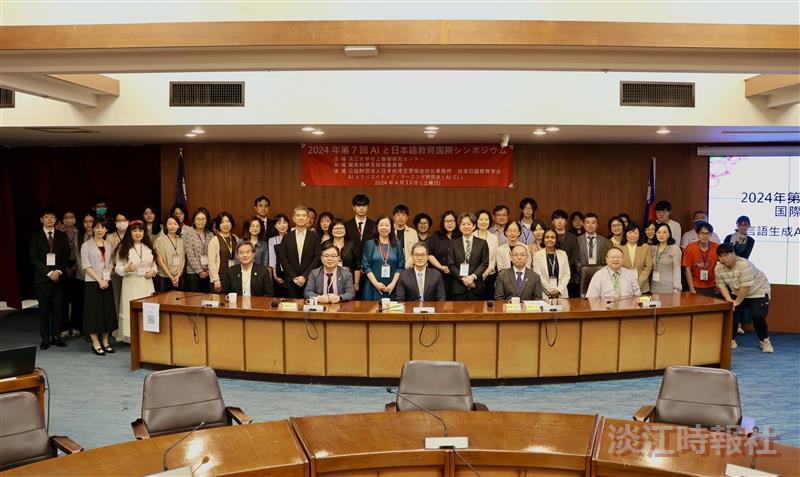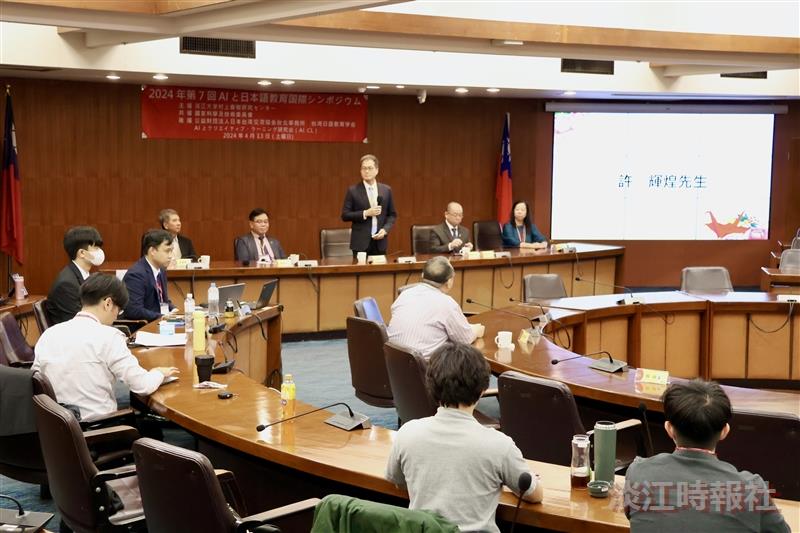News and Events
Murakami Haruki Center Hosts Cross-Domain AI Innovation Japanese Seminar for the 7th Consecutive Year
Date 2024-04-22 222 Clicks

Murakami Haruki Center Hosts Cross-Domain AI Innovation Japanese Seminar for the 7th Consecutive YearGroup photo of the 2024 International Academic Conference on Japanese Language Education Research in Taiwan.
The 7th Academic Conference on AI and Japanese Language Education, organized by the Center for Murakamiharuki Studies in Tamkang University (CMSTKU), was held on April 13 at the Ching-Sheng International Conference Hall. The theme of this event was "Japanese Language Education with Language Generation AI Technology," with nearly 200 scholars, experts, and students from Japan, Sri Lanka, South Korea, and other countries participating. During the closing ceremony, Director Chiu-Kuei Tseng announced that the 8th conference would be held in April next year, expressing anticipation for continued interdisciplinary discussions on innovative Japanese language education with scholars and experts.
Vice President for Academic Affairs Hui-Huang Hsu mentioned in his opening speech that generative AI can provide rough translations, refine translations, edit, write articles, and even offer complete explanations in foreign language teaching. "How can we continue to teach students in traditional ways?" he emphasized. "We should no longer view AI tools as enemies of foreign language teaching but rather understand and utilize them to make them a powerful weapon for foreign language teaching and learning." Due to prior commitments, Secretary-General Chiaki Muramoto of the Cultural Affairs and Public Relations Department at the Taipei Office of the Japan-Taiwan Exchange Association could not attend, and a Japanese language expert from the Association delivered the congratulatory message on her behalf. She admired CMSTKU’s foresight in combining AI innovation with Japanese language teaching seven years ago. The Center has been holding international academic conferences annually, accumulating remarkable achievements that even Japan cannot match, becoming a paradigm for foreign language learning in the AI era.
The 3 keynote speeches began with a presentation by Professor Chih-Yung Chang, a distinguished professor in the Department of Computer Science and Information Engineering at Tamkang University, on the topic "Innovation and Challenges of Generative AI in Japanese Language Learning." He comprehensively explained the astonishing growth of AI beyond imagination and provided widely used examples of generative AI in Japanese language education. He speculated that AI will surpass human intelligence within three years: "If we don't learn AI soon, it won't be AI replacing humans, but rather AI-capable humans replacing those who are not." Ms. Tsui-O Huang, former vice dean of the Foreign Language College at Fu Jen Catholic University, exclaimed after hearing Dr. Chang's speech, "Oh my! Professor Chih-Yung Chang, who doesn't speak a single Japanese word, can teach professional artificial intelligence using Japanese!" She lamented that Japanese language teachers no longer have any value.
The second session, "Collaborative Innovation in Language Teaching Enhanced by ChatGPT Human-Machine Cooperation," was delivered by Director Chih-Hung Chung of the Center for Distance Education Development. He instructed on the specific techniques for using ChatGPT effectively and maximizing its performance. In the third session, Associate Professor Toshiyuki Kanamaru from Kyoto University pointed out that integrating language education and AI is a step-by-step process that can create compounded benefits for cross-domain innovative Japanese language learning.
In the afternoon, 14 papers were presented by scholars from both domestic and international backgrounds. Among them, Dr. Tseng's presentation on "The Learning Effectiveness of ChatGPT and Metaverse Applied in Japanese Writing Classroom" received enthusiastic applause from the audience. She stated that students were initially afraid of ChatGPT and the Metaverse. Still, experimental results proved that students could unlock their potential, achieve personal growth, and enhance their competitiveness in the job market through effort. "Not only does it improve students' Japanese writing abilities, but it also cultivates students' literacy in AI, DX, and human-machine collaboration," Dr. Tseng added.
SDGs #SDG04 Quality Education #SDG08 Decent Work and Economic Growth #SDG17 Partnerships for the Goals

The opening ceremony of the seminar was presided over by Vice President for Academic Affairs Hui-Huang Hsu (center), with attendees including (from left) Dean Wan-Bau Wu of the College of Foreign Languages and Literatures, Vice President for Administrative Affairs Chen-Nan Lai of Fu Jen Catholic University, Japanese language expert Tomohiko Fujita from the Japan-Taiwan Exchange Association, and Director Chiu-Kuei Tseng of the Murakami Haruki Research Center.
LINKS
- PREV:Impressive Performance: Tamkang Commissioned by MOE to Assist Colleges and Universities in Energy Conservation 2024-04-15
- NEXT:TKU and AIT Jointly Promote EMI Training: 11 Teachers Obtain Certificates 2024-04-22
- Open Application for Flexible Academic System Encourage Interdisciplinary Learning 2024-05-12
- TKU Forges Sisterhood Alliance with UAEH in Mexico, Dr. Hsiao-Chuan Chen Awarded Honorary Professorship 2024-05-06
- NCL Academic Resource Energy Report: “Journal of Educational Media & Library Sciences” Awarded 4 Times 2024-05-06
- 2024 International Intelligent RoboSports Cup: Electrical and Computer Engineering Department's Robotics Achieves Outstanding Results Again 2024-05-06
- Class Representatives Actively Engage in Discussion: Face-to-Face Interaction Between Teachers and Students 2024-04-29
- Read Riddles & Solve Puzzles: World Book & Copyright Day Invites You to Exercise Your Brain 2024-04-29
- Gender Mainstreaming Lecture: Dr. Yi-Chun Lin Guides You to “See” Gender Blindness 2024-04-29
- Unveiling of Advanced Quantum Computing Center on the 25th Propels Tamkang into the Quantum Era 2024-04-29
- In Appreciation of Chen-Rong Chian's Donation to Research, Aerospace Department Gifts Rocket Model 2024-04-29
- Skywentex Entrusts Carbon Footprint Verification, Signs Agreement with TKU on the 25th 2024-04-29